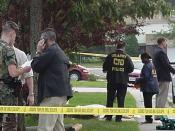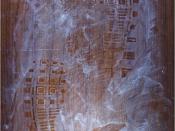A first officer attending a crime scene or incident has to perform a number of critical steps as part of the preliminary investigation. These steps include preserving life, assessing the scene, protecting evidence, managing people at the scene, summoning assistance, securing the scene, guarding the scene and recording a log in their notebook. Underpinning all these important steps, a first attending officer's primary consideration (after preserving life), should be to preserve the crime scene. Preserving the crime scene protects the integrity of the evidence and therefore the validity of the investigation. The truth can only deducted from factual information. Contaminated, moved or tampered evidence can pervert the course of justice.
The steps that should be carried out by the first attending officer at a scene or incident are listed below. They do not necessarily need be carried out sequentially, the attending officer has the discretion to act according to the different circumstances he or she may face.
However in following these steps, the first attending officer can ensure best practice is followed and important actions are not missed.
The first officer's initial priority on arrival at the scene or incident is to preserve lives, both of the victims as well as their own. Robbins, RK (1993) p19, explains that 'Early arrival can prevent ... further injury, or even loss of life'. This priority is reiterated in the NSW Police Service Handbook 'Crime Scenes' (2004), which begins their list of steps (for the first officer at the scene/incident) with the assessment of hazards, followed by a check for vital signs and then arranging for 'first aid for anyone'. As a result of this priority, It is permissible for the protection of life to occur at the expense of evidence. However, this must be recorded in the officer's notebook and investigators are...



The importance of preserving a crime/incident scene cannot be understated
A very few technical points:
1st paragraph: their notebook is proper only if it is a shared notebook. Why not use, "the officer's notebook"? Gender neutral, and clear.
2d paragraph, 2d sentence: needs at least a semi-colon to avoid being a run-on.
3d paragraph: replace "their own" with "the officer's own."
Also 3d paragraph: "As a result of this priority, It is permissible for the protection of life to occur at the expense of evidence." Awkward. Can the point be stated more clearly.
7th paragraph: "gun shot residue can be removed if the suspect washed their hands" It should be a singular, and I think "his" is reasonable.
Beyond these, my overall comments: This is one of the most impressive essays I have yet found on this cite. It is filled with factual information. It reflects very solid research and thought, and shows the hand of a very precise, thoughtful writer.
BRAVO!
BRAVO!
3 out of 3 people found this comment useful.